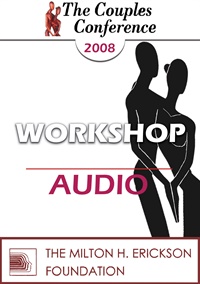CC08 Workshop 05 - A Developmental Approach to Couples Therapy: An Introduction to Attachment and Differentiation in Couples Therapy - Ellyn Bader, PhD
- Average Rating:
- Not yet rated
- Topic Areas:
- Workshops | Attachment | Couples Therapy | Developmental Therapy Model | Differentiation | Therapist Techniques
- Categories:
- Couples Conference | Couples Conference 2008 | Pioneers in Couples and Family Therapy
- Faculty:
- Ellyn Bader, PhD
- Duration:
- 1:41:27
- Format:
- Audio Only
- Original Program Date:
- Apr 26, 2008
- License:
- Never Expires.
Description
Description: Bader reveals how therapists can help partners break destructive cycles, manage anxiety, and build deeper intimacy by understanding attachment, differentiation, and relationship growth stages.
Syllabus Description: Using a developmental lens is a powerful way to lead couples to make sustained change. Learn how developmental principles can help you assess what is wrong and then guide and shape your treatment decisions. Videotapes and clinical case examples will be used throughout the workshop to demonstrate how to challenge symbiosis, facilitate differentiation and build the capacities to sustain intimacy.
Educational Objectives:
- To describe a central dynamic that leads to affairs.
- Given a couple, describe when to intervene at an intra-psychic level, and when to intervene systemically.
*Sessions may be edited for content and to preserve confidentiality*
Credits
Handouts
| Timestamped Transcript (753.9 KB) | 16 Pages | Available after Purchase |
| Timestamped Transcript (963.5 KB) | 23 Pages | Available after Purchase |
| Ericksonian Learning Snapshot (248.2 KB) | 2 Pages | Available after Purchase |
Faculty

Ellyn Bader, PhD Related Seminars and Products
Ellyn Bader, PhD, is a founder and director of The Couples Institute in Menlo Park, California. As a clinical psychologist, workshop leader, author, and speaker, she is dedicated to helping couples create extraordinary relationships. Over the past 30 years she has trained therapists in couples therapy throughout the United States as well as Europe, Asia, South America, and Australia. She served as a Clinical Faculty in Stanford University School of Medicine for 8 years.


